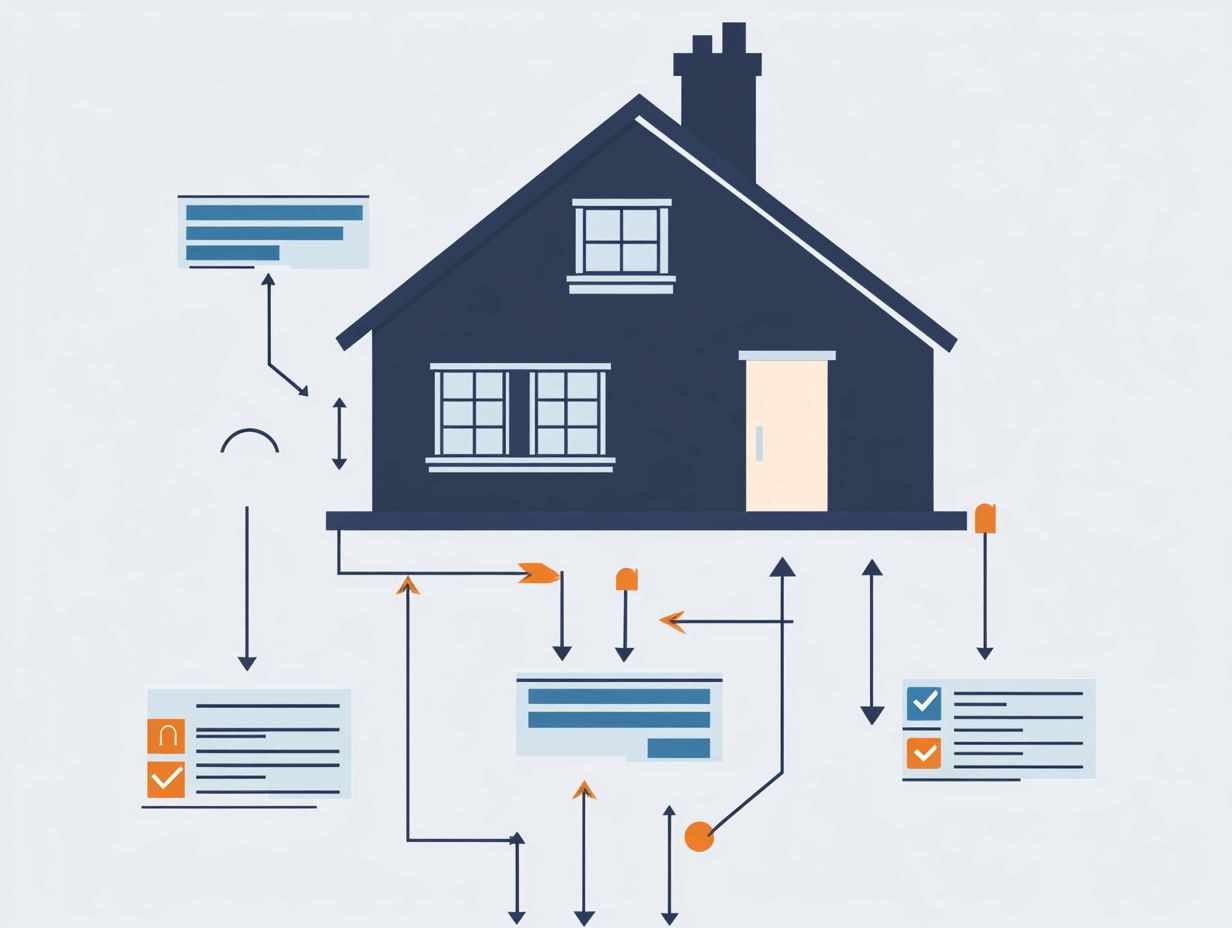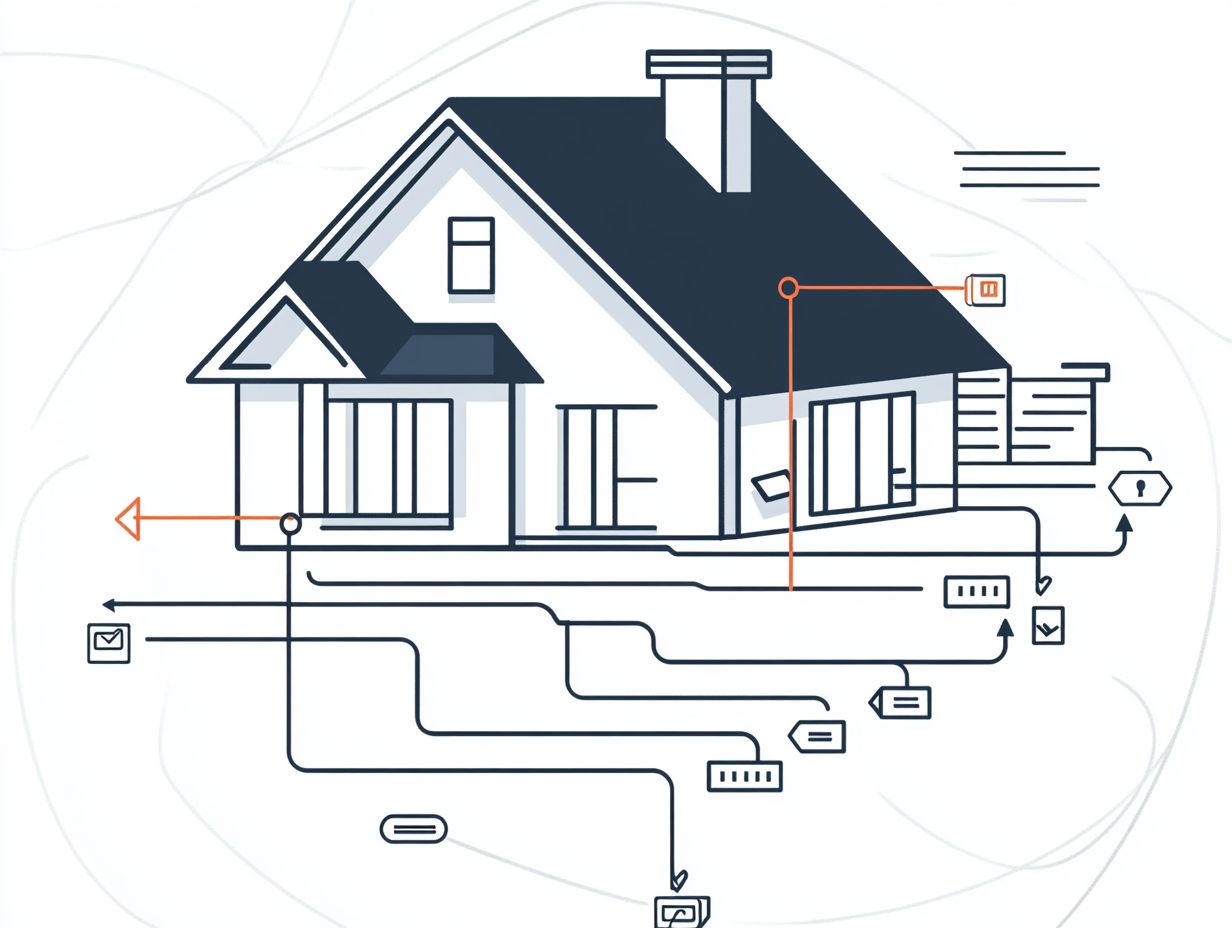Understanding the Mortgage Application Timeline
Navigating the mortgage application process may seem daunting, but it doesn’t have to be that way. By gathering essential documents and understanding the steps involved in submitting your application, you can truly transform your experience.
This guide will lead you through each stage of the process. We offer tips to sidestep common pitfalls and provide valuable insights into the approval timeline.
Whether you re a first-time homebuyer or considering a refinance, this article will equip you with the essential knowledge for a successful mortgage journey.
Contents
- Key Takeaways:
- The Mortgage Application Process
- Preparing for the Application
- Submitting the Application
- Timeline for Application Approval
- Closing on the Mortgage
- Tips for a Smooth Application Process
- Frequently Asked Questions
- What is the mortgage application timeline?
- What are the stages of the mortgage application timeline?
- How long does it take to get pre-approved for a mortgage?
- How does the underwriting process affect the mortgage application timeline?
- What can delay the mortgage application timeline?
- Can the mortgage application timeline be expedited?
Key Takeaways:

Plan ahead and gather all necessary documents before starting the mortgage application process to avoid delays. Be aware of factors that can affect the approval timeline, such as your credit score and property appraisal, and work to improve them if needed. Closing on a mortgage involves finalizing important paperwork and meeting specific requirements, so stay organized and informed to make the process smoother.
The Mortgage Application Process
The mortgage application process is a pivotal journey for you as an aspiring homeowner. It weaves together essential steps like pre-approval, loan processing, and understanding closing costs.
This journey typically starts with house hunting. You’ll need to gather vital financial documents and property information to present to your mortgage lender.
Understanding the details of this process can greatly simplify your path to homeownership. It covers everything from obtaining a credit report to preparing for a home inspection and securing mortgage insurance.
Overview of Steps and Requirements
The mortgage application process involves several essential steps and requirements that are vital for securing your loan. It all begins with obtaining pre-approval, which helps you understand your budget and eligibility.
This initial phase is crucial as it gives you a clear picture of how much a lender is willing to offer based on your financial situation. After securing pre-approval, you’ll need to gather various financial documents, including:
- Tax returns
- Pay stubs
- Bank statements
These documents are instrumental in verifying your income and expenses. A credit report is also important; it provides lenders with valuable insight into your creditworthiness, which directly influences the interest rate and terms they can offer you.
A home appraisal is also necessary to determine the property’s market value. This step ensures that the loan amount aligns with the home’s worth, ultimately protecting both you and the lender throughout the transaction.
Preparing for the Application
Preparing for your mortgage application is a meticulous process that demands thorough organization and readiness. Make sure all your financial documents are ready you don t want to delay your application!
This groundwork will set you up for success when presenting a compelling case to your mortgage lender. Understanding the significance of earnest money can also be pivotal during negotiations in your house-hunting journey.
Gathering Necessary Documents
Gathering the necessary documents for your mortgage application is crucial. Collect various financial records, such as pay stubs, tax returns, and bank statements to present to your mortgage lender.
This task not only ensures you meet the lender’s requirements but also significantly influences your eligibility and the loan amount you can secure. A loan estimate is particularly important as it helps you understand the costs involved, including the interest rate and closing fees.
Having well-organized documentation like your W-2 forms, which show your annual income, proof of additional income, and documentation of assets at the ready can greatly expedite the approval process.
Each document serves as a snapshot of your financial health. Approach this task methodically to secure the most favorable mortgage deal possible.
Submitting the Application

Submitting your mortgage application marks a pivotal moment in your journey toward homeownership. This step involves engaging in a thorough dialogue with your mortgage lender, setting in motion the intricate processes of loan processing and underwriting.
Are you ready to unlock the door to your new home? Start gathering your documents today and take the first step toward your dream home!
Application Submission Methods
You can submit your mortgage application in several ways. This includes the convenience of online submission through your lender s platform or the traditional route of in-person submission at their office. Each method has unique benefits.
Knowing your options can make getting financing easier. Online submissions offer a level of convenience that s hard to beat. You can fill out forms and upload documents from the comfort of your living room, saving valuable time and eliminating the hassle of scheduling appointments.
On the other hand, meeting face-to-face with a mortgage expert provides a more personalized experience. This allows you to ask questions, clarify any concerns, and build rapport, leading to a loan product tailored to your specific needs.
Each submission method comes with its own set of advantages and disadvantages, significantly influencing your overall borrower experience.
Timeline for Application Approval
Understanding the timeline for application approval is essential, as it can fluctuate considerably based on several factors.
These factors include the efficiency of your mortgage lender, the intricacies of your application, and the current mortgage rates in the market.
Factors that Affect Approval Time
Several factors can impact the approval time of your mortgage application, such as the completeness of your financial documents, the accuracy of your credit report, and your lender’s responsiveness.
To ensure a smoother approval process, provide all necessary documents upfront, like pay stubs, tax returns, and bank statements. Incomplete submissions can lead to delays, as lenders often request additional information.
Maintaining an accurate credit report is also crucial; even a minor discrepancy can slow down the review process. Regularly checking your credit for errors and taking corrective actions is wise.
Your lender’s responsiveness is also crucial. Selecting a lender known for efficiency can help expedite any concerns or document requests, making your journey far less stressful. For instance, opting for a lender that offers online portals for document uploads can significantly speed things up.
Closing on the Mortgage
Closing on your mortgage means finalizing the terms of your loan and settling all associated costs. This process includes fees, home inspection costs, and mortgage insurance, while collaborating closely with your lender to ensure a smooth transaction.
Final Steps and Requirements

The final steps for closing on your mortgage typically involve reviewing and signing the closing disclosure, settling the fees, and confirming that the home appraisal and mortgage insurance requirements are fully satisfied.
Make sure to do a final walkthrough of your new home it s your chance to catch any last-minute issues! This critical step not only protects your investment but also provides peace of mind before the transfer of ownership.
Coordinating with your lender to finalize loan documents and funding arrangements is essential. Each of these tasks plays a vital role in the overall transaction, safeguarding your interests while ensuring compliance with legal and financial obligations. This diligence ultimately paves the way for a successful closing.
Tips for a Smooth Application Process
To ensure a seamless mortgage application process, prepare thoroughly, communicate clearly with your lender, and maintain an organized approach.
This is particularly important during the house hunting phase, where having your financial documents ready can make all the difference.
Don t wait take the first step toward your dream home now!
Common Pitfalls to Avoid
Many people overlook the importance of providing complete financial documents. Neglecting this can delay or even deny your mortgage application.
Consistency in your financial records is key. Inconsistencies can raise red flags and lead to closer scrutiny from lenders.
Gather all required documents, such as W-2s, pay stubs, and tax returns, well in advance. Regularly checking your credit score can help you identify areas for improvement before submitting your application.
By addressing these common mistakes early, you can greatly boost your chances of securing favorable loan terms!
Frequently Asked Questions
What is the mortgage application timeline?
The mortgage application timeline is the process from applying for a loan to the lender’s final decision. To better understand this timeline, you can refer to what to expect during the mortgage application process, which usually takes 30-45 days but can vary based on individual situations.
What are the stages of the mortgage application timeline?

The stages include pre-approval, loan application, processing, underwriting, loan approval, and closing. While borrowers complete pre-approval and loan applications, lenders handle processing, underwriting, and loan approval.
How long does it take to get pre-approved for a mortgage?
Pre-approval usually takes 2-3 days. During this stage, the borrower submits financial information for the lender to review.
How does the underwriting process affect the mortgage application timeline?
Underwriting involves reviewing the borrower’s financial information and the property’s value. This process can take 2-4 weeks, depending on the loan’s complexity.
What can delay the mortgage application timeline?
Delays can occur due to incomplete or inaccurate information, appraisal issues, or additional documentation requests. Responding quickly to the lender’s requests is crucial to avoid delays.
Can the mortgage application timeline be expedited?
In some cases, the timeline can be expedited, especially for borrowers with strong credit and straightforward applications. Communicating any urgent factors, like a closing date, to the lender can help speed up the process.






